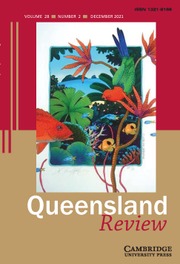No CrossRef data available.
Article contents
‘Ropes of stories’: Jean Rhys, Vivienne Cleven and Melissa Lucashenko
Published online by Cambridge University Press: 07 May 2015
Extract
Cultural narratives also function as lifelines in the work of another Queensland Indigenous woman writer, Vivienne Cleven. Cleven's novel, Bitin’ Back (2001), begins when Mavis Dooley's son, Nevil, announces that he is no longer Nevil, but the writer Jean Rhys. Although Nevil eventually reveals that he has simply been acting as a woman in order to understand the protagonist of the novel he is writing, his choice of Rhys in particular is significant. Nevil selected Jean Rhys as a signifier of his female role because, he explains:
She's my favourite author; she wrote Wide Sargasso Sea [1966]. She was ahead of her time; she wrote about society's underdogs; about rejection and the madness of isolation. I know it sounds all crazy to you, Ma, but this is about who I am . . . [A] lot of people would never understand me and they wouldn't want to. (2001: 184)
- Type
- Articles
- Information
- Copyright
- Copyright © The Author(s) 2015




